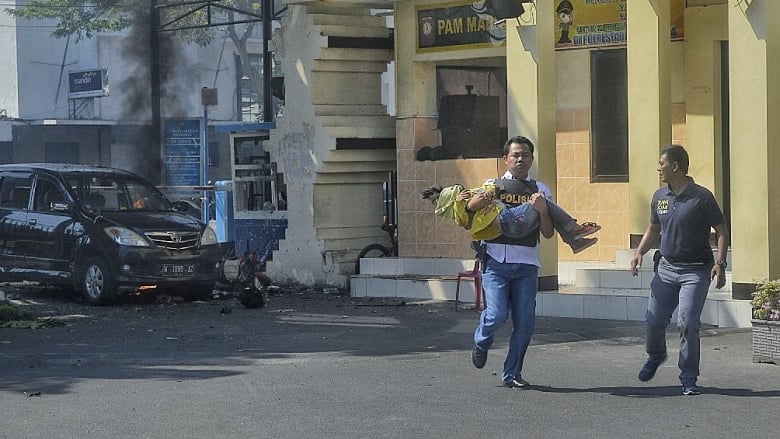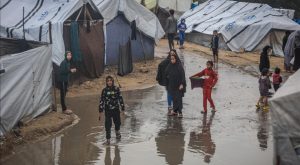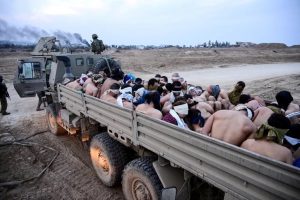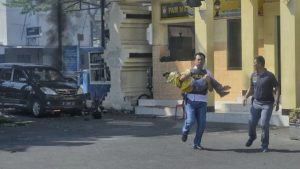Jakarta, MINA — There are multiple photos of Ita, as she was nicknamed, posing with her siblings. She is snapped coquettishly holding a rose, in front of an Angry Birds stuffed toy, perched on a bicycle carriage, hoisted on her brother’s shoulder and at the beach.
This window into an apparently happy family life makes what happened on Sunday, May 13, all the more incomprehensible, reports The Age.
At 7.45am Ita, her mother and her 12-year-old sister tried to enter a church in Surabaya, Indonesia’s second-largest city, which has a large ethnic Chinese Christian population.
Explosives were strapped to their waists. When a security guard stopped them, they blew themselves up.
Also Read: Rally of 1,000 Indonesian Volunteers Held to Support Gaza Reconstruction
A week later Indonesia is still reeling from a wave of terror attacks Wikipedia has already dubbed the 2018 Surabaya bombings.
Ita’s mother, Puji Kuswati, had not been acting alone.
Ita’s father, Dita Oeprianto, and two older brothers targeted two other churches in a coordinated attack that day.
Within 24 hours there were two further bombings, in an apartment complex and outside a police station. These were detonated by two families who had met regularly with Ita’s family to study the Koran and watch jihadist movies on Sunday evenings.
Also Read: Indonesia’s Rizky Ridho Surpasses Barcelona Star in FIFA Puskas Award Voting
The Surabaya attacks – 27 people including the bombers were killed and another 50 wounded – are the deadliest in Indonesia since the 2002 Bali bombing.
Islamic State claimed responsibility for the attacks in a message carried on its Amaq propaganda arm. It emerged Dita was the leader of the Surabaya cell of Jemaah Ansharut Daulah (Congregation of Supporters of the [Islamic] State), an extreme Islamist network that has pledged allegiance to IS.
Unprecedented use of child suicide bombers
Also Read: Ground Movement Hits Central Java: Residents Evacuate, Dozens of Homes Damaged
But what shocked Indonesia most was the unprecedented use of child suicide bombers in the country.
Just days before Ita died, neighbours heard her pleading for a new dress for the Islamic holiday of Lebaran next month.
“If she knew she was going to die that Sunday, why would she cry for a new dress for Lebaran?” asks a horrified Indonesian police officer, who witnessed one of the bombings. “They [the parents] are not human. Especially the father.”
Child suicide bombers have been used in other modern conflicts, including by Palestinian militant groups and the Tamil Tigers in Sri Lanka.
Also Read: Indonesia Reaffirms Full Support for Palestinian Independence Before Jordan’s King
A ghastly video to emerge from the Syrian conflict in December 2016 purported to show nine-year-old “Fatima” about to carry out a “martyrdom operation” in Damascus.
The film suggested “this duty fell to children” because the fighting men had fled “in the green buses”, a reference to the evacuation of Aleppo at that time.
It is unknown whether the attack was carried out.
And a 2017 UNICEF report said an “alarming” number of children in Africa – most of them girls – had been used as suicide bombers by Nigeria’s militant Islamist group Boko Haram.
Also Read: Majenang Landslide: 21 Missing in Central Java
However counter-terrorism analyst Noor Huda Ismail says it is an “extremely disturbing new development” in Indonesia.
“The Indonesian government must take this seriously because now you see the level of brutality, the level of pragmatism. They do not mind even sacrificing a member of their family.”
The chilling family bombings
Also Read: BPOM Sets MURI Record for Producing 810 Reference Standard Compounds
The chilling family bombings have implications that could ripple across the world.
What it means is that the types of potential attackers has been further broadened,” says Greg Fealy, an associate professor at the Australian National University.
“It’s a bit like the decision that terrorists made some time ago, in the Middle East certainly, to use women as suicide bombers precisely because they held better prospects of getting through security than men did. Normally children would not have attracted close attention from security services. From now on that will have to change.”
Even at the height of the influence of Jemaah Islamiyah, the terrorist group responsible for the Bali bombings, only an adult male would ever be considered a warrior, according to terrorism analyst Sidney Jones.
Also Read: Densus 88 Confirms Jakarta School Explosion Was Not Terror-Related
But IS had managed to turn the concept of jihad into a family affair, with a role for everyone.
“Women were ‘lionesses’, children were ‘cubs’,” Jones writes on The Lowy Institute’s website. “Everyone was given a sense of mission … The problem was that many of the women were not satisfied with the very traditional role [IS] assigned them. Some, as we know from observing social media, wanted more action and admired women suicide bombers in Palestine, Iraq and Chechnya.”
Jones and other analysts believe the involvement of whole families in terrorist attacks means deradicalisation programs need a rethink. “It means deradicalisation has to happen as a family – it can’t only be aimed at the men,” she says.
This is something long argued by Noor Huda Ismail, best known in Indonesia for trying to re-integrate former terrorists into mainstream society by employing them at his deradicalisation cafe in Solo, Java. (T/RS5/RS1)
Also Read: Police Name Suspect in Jakarta High School Explosion
Mi’raj Islamic News Agency (MINA)



























 Mina Indonesia
Mina Indonesia Mina Arabic
Mina Arabic